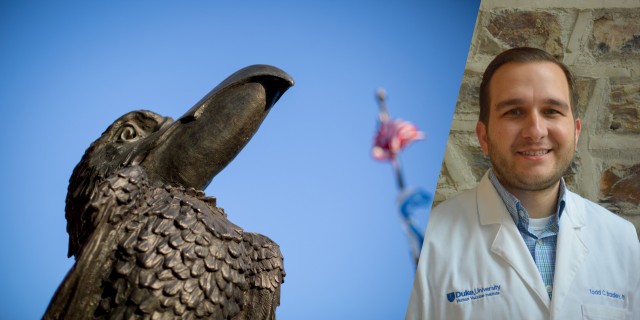Todd Bradley, Ph.D., Medical Instructor and Director of Viral Genetic Analysis at Duke Human Vaccine Institute
Age: 32
KU Degree: Human Biology (2007)
Why he’s a Hawk to Watch:
Todd has been recognized as a rising young medical researcher, who has made significant discoveries both at understanding the precise mechanisms of cellular genomic regulation to current efforts to develop an effective HIV-1 vaccine. Now as a faculty member at Duke University, he hopes his efforts to understand how our immune system responds to pathogens translates into novel therapeutics and vaccines that can improve the lives of patients around the world.
 What do you feel is your biggest achievement so far?
What do you feel is your biggest achievement so far?
I feel my biggest achievement is tackling some of our largest scientific challenges and working with top scientists, utilizing cutting-edge technologies, to make significant insights that bring us closer to bettering the lives of people afflicted with disease. This work has led to publication in leading scientific journals and candidate targets for developing new therapies. Most recently, I have been a part of the Center for HIV/AIDS Vaccine Immunology and Immunogen Discovery at Duke University that was established by the National Institute for Allergy and Infectious Diseases to undertake immunologic research that will spur the development of an effective HIV-1 vaccine. As part of this team I have contributed to understanding the mechanism of how neutralizing antibodies develop in response to HIV.
What’s your lowest career moment and how did you pick yourself up and move on?
Doing research on tough scientific problems comes with dealing with constant failures and dead-ends. When experiments fail that took a lot of effort and time, I have learned to give myself a day to be frustrated but then return to the results. I have found that in most cases there is something to be learned from my failures and in certain circumstances a surprising discovery can result. Learning to embrace failure has given me the courage to keep pushing to understand these complex biological problems.
Where do you hope to be in 10 years?
I hope in 10 years I will have established myself as a leading scientist with an established laboratory, developing new therapies and continue to be fortunate enough to do research on complex scientific problems.
What do you know now that you wish you could tell your 18-year-old self?
I would tell my 18-year-old self to not sweat the small stuff, follow your heart and enjoy the journey. Many setbacks that feel like the end of the world at the time usually promote personal growth and make you a better person in the long run.
What’s your best career pro-tip?
My best career pro-tip is to be a great collaborator, even if it means sacrificing some individual glory. In scientific research and other careers two heads are better than one and twenty are better than two, being a good collaborator will allow you to side-step failures and open new opportunities you never knew existed.
What do you do after you’ve clocked out?
Being cooped up in a lab all day, I love to be outdoors when I’m not working. There are great hiking trains, mountains and beaches here in North Carolina that are great escapes.
What is a fun fact about you that no one knows?
I would drop everything to be a part of a space mission to Mars. No questions asked. I have always had an extreme fascination with space since I was young that I don’t really share. Maybe I should include that in my 10-year plan.
